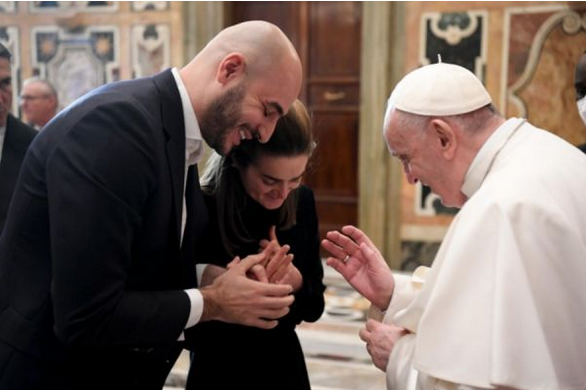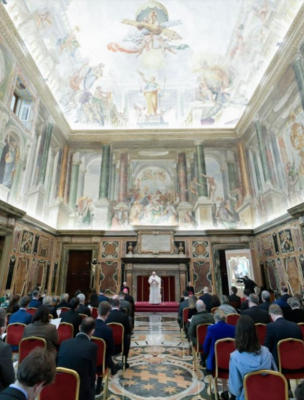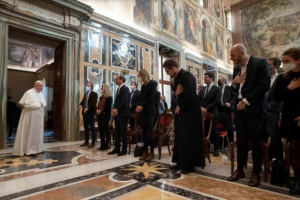Vatican News, CNA, CBJ—Pope Francis spoke to a group of French entrepreneurs meeting at the Vatican on January 7. He focused on how to apply the Gospel values in their work and businesses, saying “the Church needs your witness,” and offering teachings to help “carry out your role as leaders according to the heart of God.”
Keep your gaze fixed on Jesus Christ
“I realize how demanding and difficult it can be to implement the Gospel in a competitive professional world,” Pope Francis said.
“Nonetheless, I invite you to keep your gaze fixed on Jesus Christ through your prayer life and the offering of your daily work. He had the experience on the cross of loving to the end, of fulfilling his mission to the point of giving his life.”
Christian business leaders have their own crosses to bear, the Holy Father acknowledged, but he encouraged enduring these crosses with the grace and confidence of knowing that Jesus has “promised to accompany us ‘to the end of the world” (Matthew 28:20).
“Do not hesitate to invoke the Holy Spirit to guide your choices.”
Serve the Common Good
The conference, entitled “The Journey of the Common Good,” attracted more than 90 business French business professionals to discuss “how to transform your company to put it at the service of the Common Good.”
“I find it very beautiful and courageous that, in today’s world often marked by individualism, indifference and even the marginalization of the most vulnerable people, some entrepreneurs and business leaders have at heart the service of everyone and not just private interests or inner circles,” Pope Francis told the entrepreneurs.
Regarding the challenge of the common good, Pope Francis mentioned two pairs of concepts based on the Gospel values that appear to be in tension, yet which—with the help of grace—can unify the life of a Christian. These concepts are: ideal and reality, and authority and service.
The Ideal and Reality
A Christian often experiences a ‘collision’ between the ideal he or she dreams of and the reality he or she encounters, noted the pope.
Just like the Virgin Mary, who had to give birth to the Son of God in the poverty of a stable, Pope Francis said, “there is a painful clash between expectations and reality.”
“The search for the common good is a matter of concern for you, an ideal in the context of your professional responsibilities,” he continued.
The tension is that the ideal must come to terms with obligations imposed by economic and financial systems currently in place, which often make a mockery of the evangelical principles of social justice and charity, noted the Holy Father. At times the business person’s task weighs on him or her and their conscience comes into conflict when the ideal of justice and the common good that they would like to achieve is not realized. That harsh reality presents itself as “a lack, a setback, a remorse, a shock.”
Solution: Faith, perseverance and the example of Mary
This situation needs to be overcome with faith in order to persevere and not become discouraged, Pope Francis said.
He offered them the example of Mary, who in the face of the “scandal of the manger,” was not discouraged and did not rebel, but instead reacted by “guarding and meditating” in her heart. She thus demonstrated an adult faith, which is strengthened by trial.
“To guard,” the Pope explained, “is to accept, in spite of the darkness and in humility, the things that are difficult to accept, that we did not want, that we could not prevent; not to try to disguise or ‘make up’ life, to escape our responsibilities.”
“‘To meditate’ is to unify in prayer the good and bad things that life is made up of, to grasp better the interweaving and the meaning in God’s perspective.”
Authority and Service
“Exercising authority as a service requires sharing it. Here too, Jesus is our teacher, when he sends his disciples on mission endowing them with his own authority,” he said, emphasizing the Catholic social principle of subsidiarity.
The tenet of subsidiarity holds that nothing should be done by a larger and more complex organization (or a higher positioned person or team) which can be done as well or better by a smaller and simpler organization (or a person or persons who are closer to the situation that needs addressing). Hence, Our Lord sends his apostles and disciples on a mission “endowing them with his own authority.”
The Holy Father continued.
Jesus “knows how to go in front of the flock to show the way,  knows how to stay among them to see what is happening there, and knows how to stay behind, to make sure that no one loses contact.”
knows how to stay among them to see what is happening there, and knows how to stay behind, to make sure that no one loses contact.”
“You are invited to put into practice the subsidiarity which enhances the autonomy and the capacity for initiative of all, especially of the least. … Thus, the Christian executive is called to carefully consider the place allotted to all people in his company, including those whose duties may appear to be of minor importance, because each is important in God’s eyes.”
Good leaders, like good shepherds, have “the smell of the sheep”
Pope Francis said he has “often urged priests and bishops to have ‘the smell of the sheep,” to immerse themselves in the reality of those entrusted to them, to get to know them, to become close to them…I believe that this advice also applies to you,” he said, encouraging them to be close to those who work with them at all levels, to take an interest in their lives, to be aware not only of their difficulties, sufferings, anxieties but also of their joys, plans and hopes.
In sum, the Holy Father acknowledged the difficulties business leaders can face in implementing the Gospel values but he encouraged us business professionals to keep our gaze firmly fixed on Jesus Christ through prayer, to offer Him our daily work and to invoke the Holy Spirit in their choices, stressing that the Church needs our Christ-centered witness in the workplace, in business leadership and in daily life.



You must be logged in to post a comment.